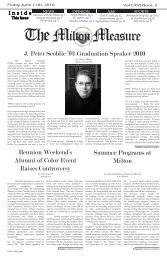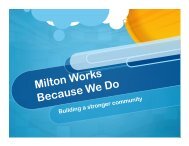Spring 2007 - Milton Academy
Spring 2007 - Milton Academy
Spring 2007 - Milton Academy
- No tags were found...
Create successful ePaper yourself
Turn your PDF publications into a flip-book with our unique Google optimized e-Paper software.
DHS, like similar agencies in other cities,strives to “overcome” homelessness, a morecomprehensive and strategy-dependentgoal than managing homelessness throughthe provision of short-term, emergencyshelter. Randy’s work involves management,qualitative analysis, and policy recommendationand formation. Recentlyhe has been particularly involved in twospecial projects: the first is to end encampmentson the city’s streets by movinghomeless individuals into shelters or moresuitable housing alternatives; the second isthe campaign focused on homeless veterans.In the former case, an interagencytask force meets regularly to coordinatehow best to address the issues presentedby encampments and their take-downwhile ensuring that clients are engagedand placed in safe and decent housing.Before he came to DHS, Randy worked onimmigration issues, such as immigrants’voting rights, where the subjects of hisactivism and advocacy were policy-makersand the public at large. Now he must usethe same skills to motivate DHS staff, rallythem around agency and program goals,and motivate them to act outside of wellestablishedcomfort zones in order to meetnew challenges.“This public service work does not attractmuch press attention but I feel stronglythat we must be there—in the trencheswith our clients who are poor and homelessor at risk of losing their home,” Randysays. “The daunting social issues that theymust struggle with on a daily basis makethem the most challenging population toserve.“DHS’ mission is two-pronged: to preventhomelessness wherever possible and provideshort-term emergency shelter and rehousingwhenever needed. On any givennight we shelter 35,000 people. They havefallen off an unstable platform and requireemergency shelter. We are about what itwill take to get them back on their feet.“I believe DHS is on the right track withrespect to priorities; we’re working hard tomeet the mayor’s goal of reducing homelessnessby two-thirds by 2009. To meetthis mandate, the agency is developingnew strategies and new initiatives. We areworking closely with many other city agenciesto achieve this goal and to ensure thebest outcome for our clients, which is permanenthousing.”How do ideas surface? Ideas come frommanagement, and most managers moveup through the ranks. Randy is happy tobe among the “idea people,” with directaccess to DHS executives who are going tolisten to his ideas. In fact, Randy’s mainreason for leaving his prior position with anonprofit organization was that the issueshe worked on were not a priority for thatorganization.Randy majored in philosophy and politicalscience at Penn. He was a New YorkUrban Fellow and earned a master’sdegree in public policy at the KennedySchool of Government [at HarvardUniversity]. He has always been commit-ted to public service. “Public service workis challenging—it’s important work and itis good work,” he says. Randy’s commitmentgrew out of his experience with Prepfor Prep and was reinforced at <strong>Milton</strong>, hesaid, “where the emphasis was on how youfit into a community, and what you bringto the community to make it a better place.“I’ve always envisioned a career in thepublic sector as giving back, taking care ofothers and not simply myself. I’ve alwaysbeen very fortunate. School came easier tome than to some others and I had lots ofopportunities. That fueled my desire toprovide opportunities to people less fortunatethan I am and to make sure that communitieswere not marginalized as a resultof poverty and homelessness.”CDERandy Quezada ’9717 <strong>Milton</strong> Magazine
















